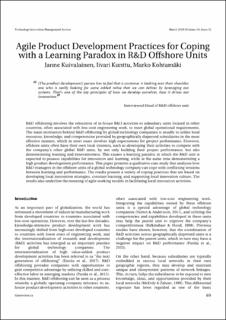Agile product development practices for coping with learning paradox in R&D offshore units
Peer reviewed, Journal article
Published version
Permanent lenke
https://hdl.handle.net/11250/2711642Utgivelsesdato
2020Metadata
Vis full innførselSamlinger
Originalversjon
Kuivalainen, J., Kunttu, I., & Kohtamäki, M. (2020). Agile Product Development Practices for Coping with Learning Paradox in R&D Offshore Units. Technology Innovation Management Review, 10(3), 69-77.. https://doi.org/10.22215/timreview/1338Sammendrag
R&D offshoring involves the relocation of in-house R&D activities to subsidiary units located in other countries, often associated with low-cost engineering work, to meet global operational requirements. The main motivation behind R&D offshoring by global technology companies is usually to utilize local resources, knowledge, and competencies provided by geographically dispersed subsidiaries in the most effective manner, which in most cases involves high expectations for project performance. However, offshore units often have their own local interests, such as developing their activities to compete with the company's other global R&D units, by not only building their project performance, but also demonstrating learning and innovativeness. This causes a learning paradox in which the R&D unit is expected to possess capabilities for innovation and learning, while at the same time demonstrating a high product development performance. This paper presents a qualitative case study that analyzes how R&D managers in the offshore units of a global technology company can cope with conflicting tensions between learning and performance. The results present a variety of coping practices that are based on developing local innovation strategies, constant learning, and supporting local innovation culture. The results also underline the meaning of agile working models in facilitating local innovation activities.

